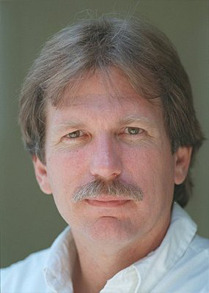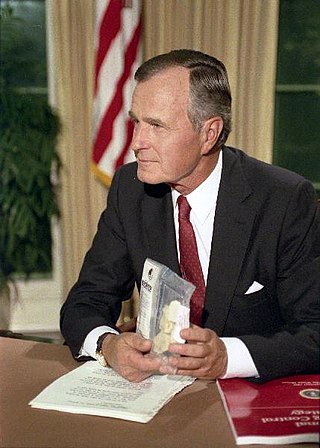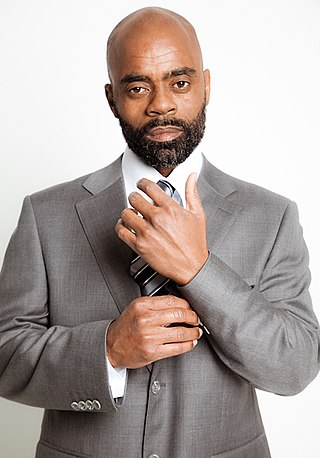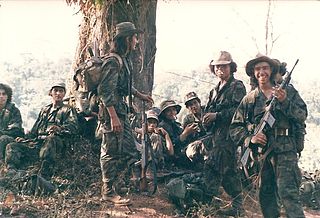
James Ambrose Johnson Jr., better known by his stage name Rick James, was an American singer-songwriter, musician, and record producer. Born and raised in Buffalo, New York, James began his musical career in his teenage years. He was in various bands before entering the U.S. Navy Reserve to avoid being drafted into the army. In 1964, James moved to Toronto, Canada, where he formed the rock band the Mynah Birds, who eventually signed a recording deal with Motown Records in 1966. James's career with the group halted after military authorities discovered his whereabouts and eventually convicted him of desertion related charges. He served several months in jail. After being released, James moved to California, where he started a variety of rock and funk groups in the late 1960s and early 1970s.

Gary Stephen Webb was an American investigative journalist.
Oscar Danilo Blandón Reyes is a Nicaraguan born drug trafficker who is best known as one of the main subjects of the 1996 newspaper series "Dark Alliance" by reporter Gary Webb.
Rayful Edmond III is an American former drug trafficker in Washington, D.C. in the 1980s. Edmond is largely responsible for having introduced crack cocaine into the Washington, D.C. area during the crack epidemic, resulting in an escalating crime rate in the city which became known as the "murder capital of the United States".

The United States Central Intelligence Agency (CIA) has been accused of involvement in drug trafficking. Books and investigations on the subject that have received general notice include works by the historian Alfred McCoy, professor and diplomat Peter Dale Scott, journalists Gary Webb and Alexander Cockburn, and writer Larry Collins. These claims have led to investigations by the United States government, including hearings and reports by the United States House of Representatives, Senate, Department of Justice, and the CIA's Inspector General.

The Kerry Committee was a US Senate subcommittee during the 100th United States Congress that examined the problems that drug cartels and drug money laundering in South and Central America and the Caribbean posed for American law enforcement and foreign policy. The Sub-Committee was chaired at the time by Democratic Party Senator John Kerry from Massachusetts so the name of the committee and the report are often referred to under his name.

Dark Alliance: The CIA, the Contras, and the Crack Cocaine Explosion is a 1998 book by journalist Gary Webb. The book is based on "Dark Alliance", Webb's three-part investigative series published in the San Jose Mercury News in August 1996. The original series claimed that, in order to help raise funds for efforts against the Nicaraguan Sandinista government, the CIA supported cocaine trafficking into the US by top members of Nicaraguan Contra Rebel organizations and allowed the subsequent crack epidemic to spread in Los Angeles. The book expands on the series and recounts media reaction to Webb's original newspaper exposé.

A number of writers have alleged that the United States Central Intelligence Agency (CIA) was involved in the Nicaraguan Contras' cocaine trafficking operations during the 1980s Nicaraguan civil war. These claims have led to investigations by the United States government, including hearings and reports by the United States House of Representatives, Senate, Department of Justice, and the CIA's Office of the Inspector General which ultimately concluded the allegations were unsupported. The subject remains controversial.

The crack epidemic was a surge of crack cocaine use in major cities across the United States throughout the entirety of the 1980s and the early 1990s. This resulted in a number of social consequences, such as increasing crime and violence in American inner city neighborhoods, a resulting backlash in the form of tough on crime policies, a massive spike in incarceration rates, and a sharp escalation of the war on drugs.
Cathleen "Cathy" Scott is a Los Angeles Times and New York Times bestselling American true crime author and investigative journalist who penned the biographies and true crime books The Killing of Tupac Shakur and The Murder of Biggie Smalls, both bestsellers in the United States and United Kingdom, and was the first to report Shakur's death. She grew up in La Mesa, California and later moved to Mission Beach, California, where she was a single parent to a son, Raymond Somers Jr. Her hip-hop books are based on the drive-by shootings that killed the rappers six months apart in the midst of what has been called the West Coast-East Coast war. Each book is dedicated to the rappers' mothers.

Ricky Donnell "Freeway Rick" Ross is an American author and former drug lord best known for the drug empire he established in Los Angeles, California, in the early to mid 1980s. He was sentenced to life in prison, though the sentence was shortened on appeal and Ross was released in 2009.

CIA activities in Nicaragua have been ongoing since the 1980s. The increasing influence gained by the Sandinista National Liberation Front, a left-wing and anti-imperialist political party in Nicaragua, led to a sharp decrease in Nicaragua–United States relations, particularly after the Nicaraguan Revolution. In 1981, President Ronald Reagan authorized the Central Intelligence Agency to support the Contras, a right-wing Nicaraguan political group to combat the influence held by the Sandinistas in the Nicaraguan government. Various anti-government rebels in Nicaragua were organized into the Nicaraguan Democratic Force, the first Contra group, at the behest of the CIA. The CIA also supplied the Contras with training and equipment, including materials related to torture and assassination. There have also been allegations that the CIA engaged in drug trafficking in Nicaragua.
A drug lord, drug baron, kingpin, lord of drugs, or narcotrafficker is a type of crime boss, who is in charge of a drug-trafficking network, organization, or enterprise.
The War on Drugs is a term for the actions taken and legislation enacted by the US federal government, intended to reduce or eliminate the production, distribution, and use of illicit drugs. The War on Drugs began during the Nixon administration with the goal of reducing the supply of and demand for illegal drugs, but an ulterior racial motivation has been proposed. The War on Drugs has led to controversial legislation and policies, including mandatory minimum penalties and stop-and-frisk searches, which have been suggested to be carried out disproportionately against minorities. The effects of the War on Drugs are contentious, with some suggesting that it has created racial disparities in arrests, prosecutions, imprisonment, and rehabilitation. Others have criticized the methodology and the conclusions of such studies. In addition to disparities in enforcement, some claim that the collateral effects of the War on Drugs have established forms of structural violence, especially for minority communities.

The Fair Sentencing Act of 2010 was an Act of Congress that was signed into federal law by United States President Barack Obama on August 3, 2010, that reduces the disparity between the amount of crack cocaine and powder cocaine needed to trigger certain federal criminal penalties from a 100:1 weight ratio to an 18:1 weight ratio and eliminated the five-year mandatory minimum sentence for simple possession of crack cocaine, among other provisions. Similar bills were introduced in several U.S. Congresses before its passage in 2010, and courts had also acted to reduce the sentencing disparity prior to the bill's passage.

Kill the Messenger is a 2014 American biographical crime thriller film directed by Michael Cuesta and written by Peter Landesman. It is based on the book of the same name by Nick Schou and the book Dark Alliance by Gary Webb. The film stars Jeremy Renner, who also produced the film. The film was released on October 10, 2014, and depicts a reporter's suppressed attempts to cover the CIA involvement and secret support of large scale cocaine sales to fund the Nicaraguan Contras.

Snowfall is an American crime drama television series, created by John Singleton, Eric Amadio, and Dave Andron. The series was broadcast by the TV channel FX in the United States. Snowfall premiered on July 5, 2017 and ended on April 19, 2023, comprising 60 episodes over six seasons.
Jemeker Thompson-Hairston is an American former drug dealer who rose to the top of the cocaine trade during the peak of the 1980s crack epidemic in the United States. She was based in "South Central" Los Angeles and had cocaine distributors in multiple US cities working for her.

White Boy is a 2017 true crime documentary directed by Shawn Rech, written by Brandon Kimber, Seth Ferranti, and Scott Burnstein, and produced by Transition Studios.
Augusto Guillermo "Willy" Falcon is a former drug kingpin who, along with his partner Sal Magluta, operated one of the most significant cocaine trafficking organizations in South Florida history.












